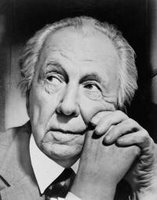Go to Galilee

The Fifth Sunday in Ordinary Time
Today’s Readings: Job 7: 1–7; Ps. 147; 1 Cor. 9: 16–23; Mk. 1: 29–39
The well-known architect, Frank Lloyd Wright, loved to tell a story about a little incident that happened when he was about 9 years old. He had an uncle who was very reserved and proper—a no-nonsense kind of man. The two of them went for a walk that took them across a snow-covered field. When they reached the far end of the field, his uncle stopped him and had him turn around. He pointed out his own footprints in the snow, which made a perfectly straight line. Then he pointed to young Frank’s tracks, which meandered all over the field. The uncle said, “Look how your tracks wander aimlessly from the fence to the cattle to the woods and back again. Now see how my tracks aim directly at my goal. There’s an important lesson in that.”
Years later, the world-famous architect enjoyed telling how the experience contributed to his philosophy in life. “I determined right then,” he said with a twinkle in his eye, “not to miss the things in life that my uncle had missed.”
Frank Lloyd Wright saw in those tracks something his uncle could not see—how easy it is to let the demands of life keep us from the joys of living.
Everybody knows that any goal in life that’s worth achieving is going to take a lot of our energy—whether it’s schooling, practice, study or simply paying our dues. But really, how important is the goal itself? Whether you’re the world’s best teacher or doctor or carpenter or farmer or mother or anything else, one day you’re going to die… and that’s that. Your days of teaching or doctoring, building or parenting are over.
Isn’t the journey to the goal more important than the goal itself? It’s on the journey that we show our true character and teach the lasting lessons of our life: whether we’re kind or nasty… patient or intolerant… honest or deceitful… humble or a puffed-up egomaniac.
We meet Jesus today at Simon and Andrew’s house. As Mark tells us, the whole town had gathered around the door, pressing in to see Jesus. The demands on him were already piling up. Every time he healed another person, or cast out a demon or taught more about his loving Father, his fame increased by another notch. And frankly, the disciples didn’t help matters. When he left early in the morning to go pray, they went searching for him. And when they found him, they said, “What are you doing? Everyone is looking for you!”
Pause right there for a moment and consider what you might say or feel in that position.
Maybe you’d be flattered: wow, they like me! They need me! I might have to widen the doorway so I can get my swollen head through.
Maybe you’d be cranky: I’m tired. They never give me a break. Can’t somebody else take care of them?
Maybe you’d feel guilty: oh, OK… I guess I better go back and keep at it. I don’t want to disappoint anyone or miss an opportunity to do God’s work.
But look what Jesus does. Something unique and important shows up in this passage. When Simon and the others interrupt his prayers to announce that everyone is looking for him, Jesus does not return to the house, but instead chooses to go on to Galilee to teach.
How come?
Maybe the Lord is demonstrating some of his humility. His life as a miracle worker and healer had to have been a constant ego-trip—and probably an ongoing temptation for him. If he had allowed himself to get caught up in the hoopla of his healing power… if our Savior had turned into a megalomaniac… would we follow such a figure?
We’ve seen too many people who seem to be able to do incredible, amazing things—and then so many of them fall from grace: politicians, celebrity entertainers, sports stars, media darlings, and even religious leaders. It’s easy to rattle off a list of well-known names, isn’t it?
But when Jesus decides to head off to Galilee, this reminds us that if we’re going to be a true follower of the Lord, we can’t pay too much attention to our own press clippings, to the people who prop us up or admire us, or to our list of good deeds.
Instead, when our work is done, there are still lessons left to teach and Christ’s work left to do. We are called humbly into service with Jesus Christ.
Frank Lloyd Wright got the message. He learned that preparation and hard work are required. He learned not to let other people define your goal. He learned: remember to pray!
And those are the same lessons we should take with us today, too. Each of us has a Galilee that is calling us. May our faith, our unique gifts, and God’s wonderful grace lead us there.

<< Home